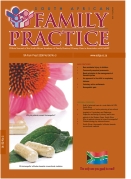Why Do Patients Choose to Consult Homeopaths?
Keywords:
homeopaths, patients, consult, family physicians, complimentary medicine
Abstract
Background: Patients are using homeopathy in increasing numbers and not telling their doctors about it. It is important as family physicians that we understand the reasons why patients choose to consult homeopaths. It is important to know what our patients are looking for that they do not find in Western medicine. This information will provide valuable insights and enable us to engage with our patients in an informed and empathetic way such engagement being vital to maintaining an open relationship and providing the best possible care and advice. Methods: The aim of this study was to understand the reasons why patients choose to consult homeopaths. Eight free-attitude interviews were conducted with purposefully selected patients who consulted a particular homeopath in Gauteng province. The exploratory question was ‘Why do you choose to consult a homeopath?’. The interviews were all conducted in English, transcribed verbatim, and analysed for categories and themes using the ‘cut and paste’ method. Member checks were done by verifying the transcribed data with the interviewees by e-mail. Triangulation of the data was done by audio-recording of the interviews, and using transcribed notes and field notes collected during the interviews. Results: All the participants initially consulted a homeopath after their health problems were not solved by mainstream medical treatment. Most were also concerned about the side effects of long-term mainstream medication. Many were frustrated with mainstream consultation or relationship factors, including rushed consultations, being asked too few questions and doctors being too quick to prescribe. Some participants said that doctors had a poor bedside manner, were difficult to talk to, and were judgmental or uncaring. The participants continued to consult homeopaths because they felt that the treatment was effective, natural and did not have side effects. They indicated that homeopathic treatment works with the body and health problems therefore are solved in the long term. This makes homeopathic treatment cheaper, because the same problem does not need to be treated repeatedly. Homeopathic consultations were longer, and homeopaths were easier to talk to and formed an equal partnership with them. In addition, problems were managed holistically mind, emotions and body, as well as work and family factors were considered. Homeopaths were considered competent and ethical and knew their limitations. Conclusion: From the reasons given for consulting homeopaths, we, as family physicians, can learn a lot about what patients consider important in their consultations and management. Frustration with some aspect of mainstream care has pushed them to look for solutions elsewhere Much of what the patients did not find with doctors but found with homeopaths can be found in the principles of family medicine. It will be important to validate the findings of this study by developing a hypothesis that can be tested using a quantitative paradigm.
Published
2008-03-26
Section
Original Research
By submitting manuscripts to SAFP, authors of original articles are assigning copyright to the South African Academy of Family Physicians. Copyright of review articles are assigned to the Publisher, Medpharm Publications (Pty) Ltd, unless otherwise specified. Authors may use their own work after publication without written permission, provided they acknowledge the original source. Individuals and academic institutions may freely copy and distribute articles published in SAFP for educational and research purposes without obtaining permission.

